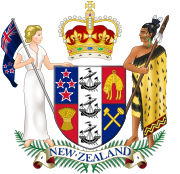- Māori Language Act 1987
-
Māori Language Act 1987 
Parliament of New ZealandLong title/
PurposeAn Act to declare the Māori language to be an official language of New Zealand, to confer the right to speak Māori in certain legal proceedings, and to establish Te Komihana Mo Te Reo Māori and define its functions and powers. Dates Date passed 1987 Commencement Immediate Other legislation Amendments 1991 Related legislation Treaty of Waitangi Act, New Zealand Sign Language Act Status: Current legislation The Māori Language Act 1987 was a piece of legislation passed by the New Zealand Parliament. It gave Te Reo Māori (the Māori language) official language status, and gave speakers a right to use it in legal settings such as in court. It also established the Māori Language Commission (initially called Te Komihana Mo Te Reo Māori but later renamed Te Taura Whiri I Te Reo Māori) to promote the language and provide advice on it.[1]
Despite the Act, Māori does not have the same status under law as English, for example, tax records must be kept in English.[1]
1991 Amendment
As well as renaming the Māori Language Commission, the 1991 Amendment slightly expanded the range of legal settings in which Te Reo could be used, to include bodies such as the Tenancy Tribunal and certain commissions of enquiry.
Context
The Act was the result of many years of campaigning by Māori, particularly those involved in the Māori protest movement. It was also the result of shifts in thinking about the Treaty of Waitangi. By the mid-1980s, the Treaty had acquired increased relevance thanks primarily to the Waitangi Tribunal. The Act also drew on a number of international precedents, primarily the Irish Bord Na Gaeilge Act 1978, which is cited several times in the legislation but also the United Kingdom's Welsh Language Act 1967, which enabled the use of the Welsh language in Welsh court proceedings.
References
Categories:- Treaty of Waitangi
- Māori politics
- Māori language
- 1987 in New Zealand
- New Zealand Statutes
- New Zealand culture
- Language policy
- Language revival
- 1987 in law
Wikimedia Foundation. 2010.
